This page develops the discussion about categorising stress for inevitably you will find that life is a mixture of all three categories.
Stresses rarely come alone. You will have some calamities that happen suddenly and unexpectedly and demand your urgent attention; but that will be on a background of longer term stresses related to the pressures and cares of life that come from work, family life, health problems etc; and then you will have personal issues that affect the sort of stresses you experience and also your reaction to them.
In the last few pages we explored them separately. You will have identified both individual stresses and also factors in your life that make you susceptible to stress. You have seen how they each may be tackled but now we will consider how they interact, sometimes helpfully, but more likely interfering and making your attempts to cope so much worse.
Here are three true-to-life stories that illustrate this.
Reuben
Reuben was depressed. He could not concentrate at work, he was irritable and his sleep was disturbed. He was angry too but did not like to think about this as he was particularly angry with himself as he knew he had something to do with his troubles though he felt he could not help what had happened. It was just the way he was. He could not change so why would other people not understand and make allowances? Especially his wife, well, now his ex-wife. She had divorced him for unreasonable behaviour. He was now living alone in a small rented apartment. He missed her.
Reuben is on a journey of grief in response to the breakup of his marriage. He is probably in stage 2 that features anger and blaming. He is not yet ready to move on in the journey of grief. He is also lonely and has a specific problem with lack of sleep. Divorce is regarded by psychologists as one of the worst life events anyone can undergo for causing stress. Even so, such problems that it generates can be managed over time. These are his presenting problems that need attention. That is enough for anyone to bear but there is more.
Reuben’s boss told him his job was at risk so he went to see his GP. He went on sick leave, took a course of antidepressant tablets and attended a Divorce Recovery Workshop. That was hard at first. He could not contribute to the discussions but felt strangely comforted after each session so he kept going. He listened to others’ stories and gradually moved from blaming his wife to considering his own contribution. That was painful! He began to share his story. He was angry and defensive at first but then started getting upset as he realised how badly he had behaved for he had been selfish and demanding. He had expected his wife to fit in with his plans and wishes. He always wanted to know where she was, what she was doing and who she was with. He gradually saw the connection with his previous failed marriage and realised he had never really come to terms with that. He came to understand he had been so frightened that his wife would leave him he had overreacted, dominated her and driven her away.
Reuben may never have recognised the significance of his first marital breakup if he had not attended the Divorce Recovery Workshop. That is not surprising. Breakups, losses and grief are not nice experiences. Most people push the memories to the back of their mind and get on with life. But the memories are still there. If they are not brought out, examined, understood and integrated they will be like a festering wound that secretly poisons life damaging personality and emotions – as Reuben found out the hard way in its influence on his next significant relationship. This is a good illustration of the ‘layering of stress.’ Once you examine and deal with the presenting stress, you may find other stresses hidden beneath that are influencing the more obvious problems. And the presenting stresses cannot be adequately dealt with until the underlying stress is recognised and managed.
Now to return to Reuben.
The Divorce Recovery Workshop came to an end. Reuben was amazed at how much he had learnt about himself. He was ashamed and horrified at how he had behaved. He planned to change. Fortunately he had made good friends at the Workshop who knew much of his story. They went walking together, met for meals and encouraged each other. Reuben was not the leader, he did not have the confidence for that. He was observant though, and contributed some humorous and wry comments so was developing his own special role in the group. He was now much more aware of the importance of give and take in relationships so he did his best to behave especially with the two friends he was close to. They knew about his past and after one episode when they objected to his attempt at control he gave them permission to call him to account if he again stepped over the line. He returned to work but kept a low profile, his self-confidence was still not recovered.
Six months later Reuben reflected on all that had transpired and sent a thank you letter to Doug, the leader of the Divorce Recovery Workshop. He was surprised to receive a phone call in reply. Could they meet for a coffee? They chatted for a while mainly about how Reuben was getting on but then Doug said, ‘Reuben, I wanted to see you for a special reason and I think you are doing so well, now would be a good time.’ Reuben was alert, whatever could this be about? Doug reminded him that in one of their group meetings Reuben had referred to his childhood and said something like, ‘I never had much of a hope of having a good marriage as my parents divorced when I was a child.’ ‘Wow! Did I say that?’ Reuben replied after a pause, ‘That must have been when I was upset. I do not usually talk about my childhood.’ They sat in silence for a while then Reuben said, ‘Let me tell you what happened. Maybe it is important. My parents divorced when I was eight and I was farmed out to my grandparents when neither mum nor dad had time for me. I was often at home alone waiting to be taken somewhere when I just wanted to stay at home. It was horrible.’ Doug nodded. ‘Do you see what I mean?’ he said, ‘Whatever happens to you as child stays with you. It affects how you relate to other people and how much of yourself you share.’ Reuben nodded, ‘You know,’ he said, ‘I always blamed myself for my parents’ divorce. I always wondered what I had done to drive my parents away. And then no one wanted me.’ Doug nodded. ‘You are so much better now. You are relaxed, making good friends, secure in yourself. I think it is time to explore a bit deeper so you understand more about what made you the man you are. That will equip you better to deal with future relationships. And hopefully your next marriage will stick!’ They laughed comfortably together.
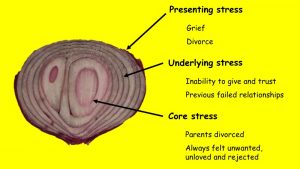
In this story we have seen that the presenting problem has a lot to do with underlying problems and now, many months later, Reuben discovers something about his core problem. This problem was at the heart of all that happened in his adult life and had been a formative factor in making him the person he was.
Reuben followed up on Doug’s suggestions. He talked to his GP to see if he could access any local NHS counselling service and contacted some private and charitable services. He found some help and over subsequent months attended a course of counselling. Reuben is still working on his issues but he has inner peace. He understands himself better and has a small circle of friends who understand and support each other. He is now engaged to a lady he met at the Divorce Recovery Workshop!
Reuben went through a really difficult few years – but survived and overcame. Grief resolves in time and in an especially wholesome way if properly managed. He learned how to develop good relationships and even changed his core personality and attitudes. He came to terms with his distressing childhood experiences and found a measure of emotional healing. He learnt to forgive and to integrate painful memories and hurts. He was resilient. Reuben’s experiences illustrate that the journey of healing from significant hurts especially those that are based on experiences in your early life take time – even years. And some effects never go away. However, they are integrated into your personal life so much so that it is as if you have become a new person, healed, secure, positive and productive.
Vanessa
Vanessa was in debt – big time. She owed thousands on her credit card, was behind with her rent and was at risk of losing her home. She was depressed and anxious so could not sleep – but then overslept so her children were repeatedly late for school. She avoided meeting her family and friends as she owed so much money to so many people she had no idea how she could ever repay them.
These were her presenting stresses.
Fortunately an assistant at the Credit Union where she had an account and was refused a further loan, knew about Christians Against Poverty so she got in touch. An adviser met her, took over the correspondence with her creditors and helped her budget so she gradually gained control over her finances. But the adviser went further. She helped Vanessa explore the reasons she had got into this mess. They discovered that Vanessa could not save. She spent everything she earned. She could not say no to her children – they had the biggest and best of everything. Together they realised that if Vanessa did not change, her financial problems would recur.
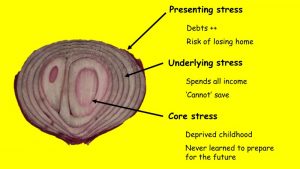
This was Vanessa’s underlying stress. Further questioning revealed that Vanessa had come from a deprived background where they lived a hand-to-mouth existence and her parents could not afford any luxuries, not even presents at birthdays or at Christmas. That was the core stress.
Once Vanessa understood that she was reacting to her childhood experiences – she did not want her children to suffer like she had and she had had no example or training in budgeting – she found it easier to discipline her spending and develop other ways of being a good parent without spoiling her children. The church where Christians Against Poverty was based had some good children and youth activities and for herself there were social groups and support networks so she found her life and prospects were improved as well as her finances.
Theresa.
Theresa always looked unhappy and stressed. She attended her GP frequently but the doctor invariably was able to reassure her that there was not much wrong. She kept to herself and did not seem to have any friends. She was always in a hurry. One day she unexpectedly met Sarah, a friend she had not seen for years. They had tea together and happily reminisced about the past. Theresa looked a different women – briefly. They met a few times. Then Sarah invited her home for a meal. The atmosphere changed. Sarah wondered what she had said wrong. Theresa rushed away. Weeks went by. Sarah had enjoyed their reawakened friendship so eventually decided to call on Theresa to find out what was wrong. Theresa opened the door. As she recognised Sarah she looked stunned, upset, horrified – and then burst into tears. Sarah stepped inside, put her arm round her and led her into the kitchen. She sat with her as Theresa wept and then she made a cup of tea. Theresa poured out her story. She apologised for walking out on her in the tearoom. Ever since, she had regretted doing that but she had been caught unprepared by her invitation and could not face explaining, so had run away. She knew if she went to Sarah’s home she would have to invite Sarah to her home. But she could not do that. She had wanted to tell her about her home life but it was her burden and she could not share it with anyone else. She just could not bring herself to do it. She had regretted running away as she so much wanted to renew their friendship. She had not realised until she met Sarah just how lonely she was. She paused to get her breath, dab her eyes and have some tea. She continued. She had cared for her disabled mother all her adult life until she died a few years ago and just as she was learning to live her own life her younger sister, Anna, had a terrible accident. Anna was brain damaged so had to come to live with her. Anna could not help it but she was verbally abusive and demanding. Theresa had promised her mother to care for Anna if ever it was needed so she did. It was her burden. No one else’s. So she would carry on. She could not invite Sarah into her home but was happy to meet her in the tearoom as there were two days each week she was free when her sister attended a Care Centre. She was worn out but had promised so would carry on.
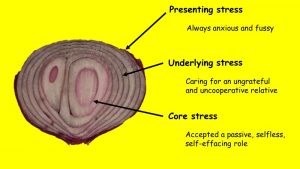
To outward appearances Theresa appeared to be chronically anxious about her health and the normal pressures of life. She could be dismissed as a natural worrier who could not be helped. Such was her presenting stress. Unbeknown to most people Theresa was carrying a heavy burden caring for her sister and that seemed very unfair having already had to spend much of her life caring for her mother. That burden was the underlying stress while her core stress was her selfless commitment to care for her family whatever the cost to herself.
There are no easy answers in situations like this. Can Theresa ‘unlearn’ some of her behavioural habits after many years? Can she obtain some extra support to help care for Anna? Even if it were available would Theresa accept the help? Will the intractable difficulties overwhelm Sarah’s friendship, sympathy and possible desire to help? Will Sarah be the next one to run away?
Pulling it Together
These three stories illustrate the concept of layering of stress. I have described three layers – presenting stress, underlying stress and core stress – but as the stories show, in each layer there may be more than one stress. Life does get complicated! Furthermore, the core stress layer that is often due to deep seated personal issues such as childhood experiences, horrific experiences of abuse at any age or personality traits, can be difficult if not impossible to self-diagnose. In each of these three stories identifying the core stress needed the help of someone else who was involved, caring and insightful and had the self-confidence to be able to share their observations.
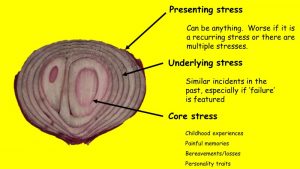
The big clue to the presence of underlying and core stresses is that presenting stresses cannot be resolved or keep recurring. It may be that they provide some form of protection to avoid having to face issues that could be overwhelming or induce a sense of shame or guilt.
Healing of some hurts may not be possible but at least they can be contained. Self-awareness and acceptance of limited goals may be all that can be achieved – at least for the time being. Sometimes it is years later before you will have the resources and support to resolve some issues.
If you are aware you may have such issues you will probably need help from a counsellor, psychologist or a medical doctor.

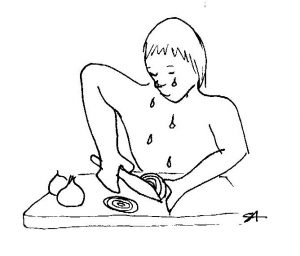
A helpful analogy that aids understanding of the layering of stress is to think of life as an onion and managing stress the act of peeling the onion. One layer of stress is resolved but underneath is another and then another. Each layer unveiled brings its own suffering and tears.
And so it goes on. But there is hope. You are on a journey. Where you are now is not where you will always be, however dark and hopeless it appears to be at present and however helpless you feel.
You are resilient – you will bounce back.
There are resources to help, though it may take time and effort to find them.
And then there is God. A compassionate and caring God who created you and has watched over you from before you were born. He longs for you to cry out to him for help – and to keep on crying. Ancient wisdom that people from all corners of the world right up to modern times have found to be true, comforting and strengthening says,
‘Come to me, all you who are weary and burdened, and I will give you rest.’
‘You hear, O Lord, the desire of the afflicted; you encourage them, and you listen to their cry.’
‘The Lord, the compassionate and gracious God, slow to anger, abounding in love and faithfulness, maintaining love to thousands, and forgiving wickedness, rebellion and sin.’
More of that later but for now hold on to such promises.
Endnote
See https://www.moneysavingexpert.com/loans/credit-unions for an introduction to Credit Unions.
Christians Against Poverty can be reached at https://capuk.org/.
Do an internet search for ‘managing debt’ to find other services.
Divorce Recovery Workshops do exist! Find them at https://drw.org.uk/.
Do an internet search for ‘divorce recovery’ to find other services.
If you wish to strengthen your marriage see https://www.careforthefamily.org.uk/family-life/marriage-support.
Do an internet search for ‘marriage support’ to find other services.
NHS Counselling Services may be available near where you live. Consult your GP.
See https://www.nhs.uk/conditions/stress-anxiety-depression/free-therapy-or-counselling/ for an introduction to counselling services.
Do an internet search for ‘local counselling services’ to find other services.
If you want help with a particular issue do an internet search for ‘(name of particular issue) local counselling services’ to find what might be available.
